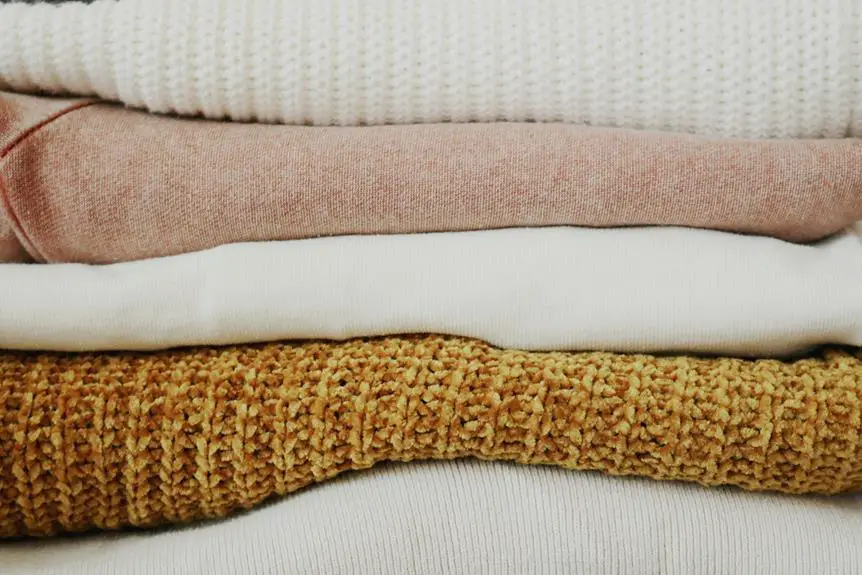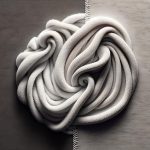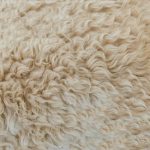You're likely no stranger to the importance of choosing the right fabrics for your baby's clothes, especially when it comes to sensitive skin. French terry, with its soft and breathable properties, is a popular choice for many parents. But can it really be used for baby clothes? On the surface, it seems like a great option – gentle on skin, easy to care for, and durable. However, there may be more to consider. As you weigh the pros and cons, you might be wondering: what are the potential drawbacks to using French terry for baby clothes, and are they significant enough to outweigh the benefits?
Table of Contents
Benefits for Sensitive Baby Skin
When it comes to dressing your baby, you'll want to choose fabrics that are gentle on their sensitive skin, and French terry is an excellent option because it's soft, breathable, and absorbent.
This fabric is perfect for babies with eczema or other skin conditions, as it won't irritate their skin like other materials might. French terry's softness also makes it ideal for babies who are prone to scratching or rubbing against their clothes.
You'll also appreciate that French terry is a natural temperature regulator, keeping your baby cool in the summer and warm in the winter. This means you can dress your baby in French terry clothes year-round, without worrying about them getting too hot or cold.
Additionally, French terry's absorbency makes it perfect for babies who are still learning to control their bladder. Accidents will happen, but with French terry, you can rest assured that your baby's skin will stay dry and comfortable.
Ease of Care and Maintenance
When it comes to caring for your baby's French terry clothes, you'll appreciate how easy it's to keep them clean and fresh.
You can simply toss them in the washing machine, making laundry day a breeze.
But what about drying and ironing – are French terry clothes just as low-maintenance in these areas too?
Machine Washable Fabric
One of the biggest advantages of using French terry for baby clothes is that it's incredibly easy to care for, thanks to its machine washable fabric that can withstand repeated washing and drying without losing its softness or shape. As a parent, you know how often baby clothes need to be washed, and with French terry, you don't have to worry about hand-washing or dry-cleaning.
When it comes to machine washing French terry, you'll love the convenience it offers.
- Less laundry hassle: You can throw French terry baby clothes in the washing machine with other similar fabrics, making laundry day a breeze.
- Quick washing: French terry washes quickly and efficiently, which is perfect for when you need to get clothes clean in a hurry.
- Gentle cycles okay: French terry can handle gentle washing cycles, making it a great choice for baby clothes that need a little extra care.
- Cold water safe: You can wash French terry in cold water, which is gentle on the fabric and saves energy.
Drying Time Matters
Machine washing is only half the story. French terry fabric's drying time is just as important to consider when it comes to its ease of care and maintenance.
French terry fabric generally dries quickly, which is a huge plus when it comes to baby clothes. The fabric's unique looped pile construction allows for good airflow, helping to speed up the drying process.
When you wash French terry fabric, you can expect it to dry in about the same time as other cotton fabrics. Thicker French terry fabrics may take a bit longer to dry than thinner ones.
To speed up the drying process, you can tumble dry French terry fabric on a low heat setting or air dry it. Either way, you can expect your French terry baby clothes to be dry and ready to wear in no time.
The quick drying time makes French terry fabric a practical choice for busy parents who need to wash and wear baby clothes frequently.
Ironing Made Easy
Ironing French terry fabric is a breeze, thanks to its smooth surface and minimal wrinkles, making it a low-maintenance choice for baby clothes. The fabric's unique weave and cotton-rich composition make it less prone to wrinkling, saving you time and effort in the long run.
When it comes to ironing French terry, you can follow these simple tips:
- Iron while the fabric is still slightly damp to reduce wrinkles and creases
- Use a low to medium heat setting to prevent scorching or damage
- Avoid using steam, as it can cause the fabric to shrink or lose its shape
- Iron the fabric inside out to prevent scorching or discoloration
Durability and Long-Lasting Wear
When it comes to dressing your baby, durability is key, and French terry fabric delivers with its ability to withstand repeated washing and wear without losing its shape or softness.
You want clothes that can keep up with your little one's active lifestyle, and French terry is up to the task. Its dense, plush pile construction makes it resistant to pilling and snagging, ensuring that your baby's clothes will look great wash after wash.
As a parent, you're likely no stranger to frequent laundry loads, and French terry fabric can handle the demands of repeated washing and drying. It's also less prone to shrinkage than other fabrics, so you don't have to worry about your baby's clothes losing their fit over time.
Plus, French terry is often made from high-quality cotton or cotton blends, which are breathable and gentle on your baby's skin. With French terry, you can trust that your baby's clothes will be durable, long-lasting, and comfortable – a winning combination for any parent.
Temperature Regulation and Comfort
When it comes to dressing your baby, you want to ensure they stay comfortable and at the right temperature.
You'll be happy to know that French Terry excels at regulating temperature and providing comfort, making it an ideal choice for baby clothes.
As you consider the benefits of French Terry, you'll want to look at its softness and breathability, thermal insulation properties, and how gentle it's on your baby's sensitive skin.
Softness and Breathability
Softness and breathability are crucial in baby clothes, and French terry excels in these areas, providing your little one with a comfortable and cozy wearing experience. When you choose French terry for your baby's clothes, you can be sure that their sensitive skin will be treated with care. The softness of French terry is unmatched, making it perfect for delicate baby skin.
- Natural fibers: French terry is often made from natural fibers like cotton, which allows for airflow and moisture transfer.
- Loose weave: The loose weave of French terry creates a fabric that's lightweight and airy, promoting breathability.
- Soft pile: The soft pile of French terry provides a comfortable surface against your baby's skin.
- Moisture-wicking properties: French terry has natural moisture-wicking properties, drawing sweat away from your baby's skin.
Thermal Insulation Properties
With its softness and breathability well-established, it's worth exploring how French terry also regulates body temperature to keep your baby comfortable, whether it's during a cozy night's sleep or a lively play session. You'll want to know how well it traps warmth when it's cold and releases heat when it's warm.
French terry's thermal insulation properties are due to its unique fabric construction, which creates air pockets that help regulate temperature. This means that French terry fabrics can keep your baby warm in cold temperatures and cool in warm temperatures.
When it's cold, the air pockets in the fabric trap warm air next to your baby's skin, keeping them cozy. Conversely, when it's warm, the fabric allows heat to escape, preventing overheating. This temperature regulation helps prevent your baby from getting too hot or too cold, ensuring they stay comfortable and relaxed.
As a parent, you'll appreciate how French terry's thermal insulation properties promote a restful sleep and a happy, active playtime. By regulating body temperature, French terry fabric helps create an ideal environment for your baby to thrive.
Gentle on Skin
As you dress your baby in French terry clothing, you can be confident that the fabric won't only regulate their body temperature but also provide a gentle, comfortable layer next to their sensitive skin.
French terry is known for its soft, plush pile that traps warm air and keeps your baby cozy, while also allowing for airflow to prevent overheating. This makes it an ideal choice for baby clothes, as it helps to maintain a comfortable body temperature and prevent irritation.
- *Breathability*: French terry allows for airflow, which helps to prevent moisture buildup and reduce the risk of skin irritation.
- *Softness*: The plush pile of French terry provides a gentle layer against your baby's skin, reducing the risk of discomfort or irritation.
- *Temperature regulation*: French terry helps to regulate body temperature, keeping your baby warm in the cold and cool in the heat.
- *Hypoallergenic*: French terry is less likely to cause allergic reactions or irritation, making it a great choice for sensitive skin.
Potential Drawbacks to Consider
French terry can be a great choice for baby clothes, but it's essential to consider a few potential drawbacks before making a final decision.
One thing to keep in mind is that French terry can be prone to pilling, especially if it's made from a lower-quality cotton blend. This can make the fabric look worn and frayed over time, which mightn't be ideal for baby clothes that need to withstand frequent washing and wear.
French terry can also be a bit heavy and thick, which mightn't be suitable for warmer weather or for babies who tend to overheat easily.
Additionally, you'll need to consider the fact that French terry can shrink in the wash, so you'll need to make sure to pre-wash and dry any fabric before sewing it into a garment. French terry can be a bit more expensive than other types of cotton fabric, which might be a consideration if you're on a budget.
French Terry for Baby Sleepwear
French terry is an excellent choice for baby sleepwear, offering a soft, breathable, and gentle fabric that can help regulate your baby's body temperature and promote a comfortable night's sleep. As a parent, you want the best for your baby, and French terry delivers. Its unique texture and weave allow for airflow and moisture-wicking properties, making it ideal for sleepwear.
When it comes to choosing French terry for baby sleepwear, consider the following benefits:
- Softness: French terry is incredibly soft against your baby's delicate skin, reducing the risk of irritation and discomfort.
- Breathability: The fabric's unique weave allows for airflow, helping to regulate your baby's body temperature and prevent overheating.
- Gentle: French terry is gentle on your baby's skin, making it perfect for sensitive skin or skin conditions like eczema.
- Easy care: French terry is easy to wash and dry, making it a practical choice for busy parents.
Choosing the Right French Terry
When selecting French terry for your baby's clothes, it's essential to consider a few key factors to ensure you choose the right type for your needs.
First, think about the season and the climate you live in. If you live in a warmer climate, you'll want a lighter-weight French terry that will keep your baby cool and comfortable. On the other hand, if you live in a cooler climate, a heavier-weight French terry will be more suitable.
Next, consider the activity level of your baby. If your baby is going to be active, you'll want a French terry that can withstand repeated washing and wear. Look for a French terry with a high cotton content, as it will be more durable and less prone to pilling.
You should also consider the color and pattern of the French terry. If you want a versatile fabric that can be used for a variety of garments, a solid color or a subtle pattern is a good choice.
Frequently Asked Questions
Is French Terry Suitable for Premature Babies?
For preemie babies, you want breathable, soft fabrics that help regulate body temperature. Considering these requirements, you'll find that French Terry works well, being gentle on sensitive skin and providing the necessary comfort and warmth.
Can I Use French Terry for Summer Clothes?
You can definitely use French terry for summer clothes! It's perfect for casual wear like t-shirts, shorts, and even rompers. Its breathable texture will keep you cool in the heat. Give it a try and you won't be disappointed.
Is French Terry Prone to Pilling or Snagging?
You'll find that French Terry can be prone to pilling or snagging, especially if it's made from a lower-quality cotton blend or if you don't follow proper care instructions, like washing it in cold water.
Can I Dye or Print on French Terry Fabric?
You can definitely dye or print on French Terry fabric, but it's essential to follow specific guidelines to achieve the best results. You'll need to choose the right dye or ink, and consider the fabric's cotton-rich blend.
Does French Terry Shrink After Washing?
You're wondering if French Terry shrinks after washing? Generally, it does, but the amount varies depending on the fabric's cotton content and weave. You can minimize shrinkage by washing it in cold water and drying it on low heat.
- How Does Ring Spun Cotton Affect Garment Fit and Shape Retention? - August 13, 2024
- What Are the Challenges in Producing Ring Spun Cotton? - August 13, 2024
- Is Ring Spun Cotton Suitable for Plus-Size Clothing? - August 13, 2024







